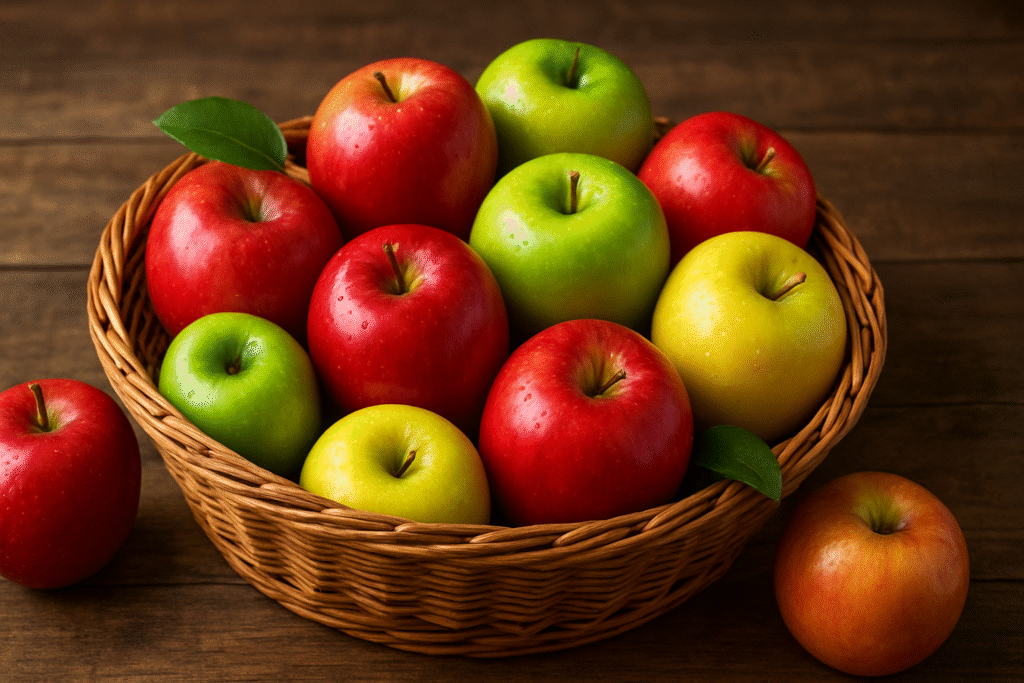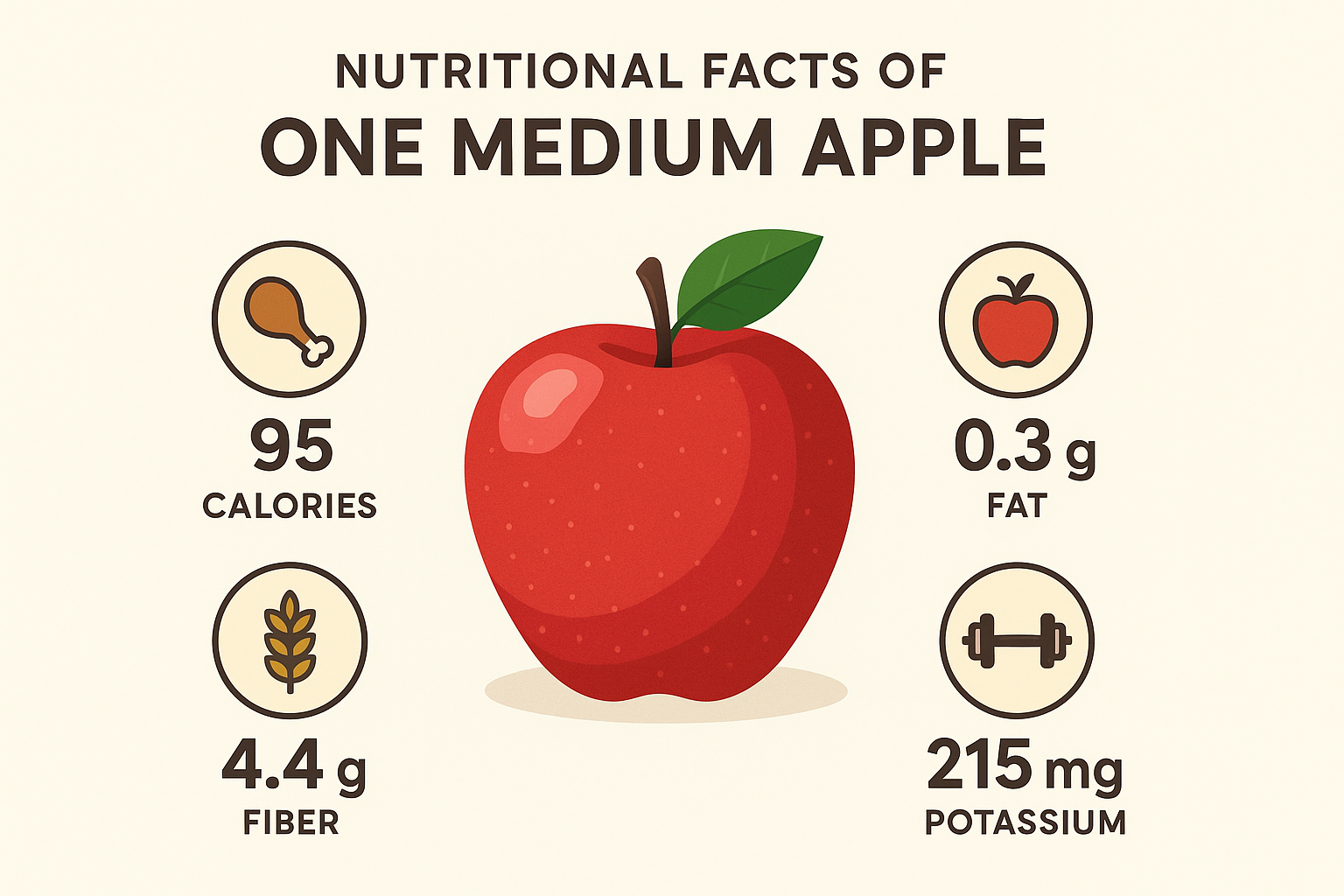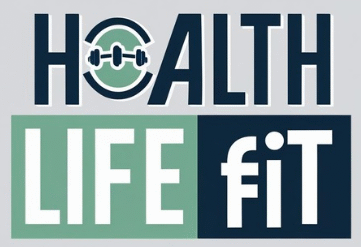The saying “An apple a day keeps the doctor away” is likely familiar to you. It seems easy, doesn’t it? You won’t get sick if you just eat one apple every day! Is it true, though?
Well, not precisely. You are not invincible just because you eat an apple. However, apples do offer strong health benefits that can keep your body healthier, stronger, and less prone to frequent medical visits.
Table of Contents
Introduction

“An apple a day keeps the doctor away.” It’s one of the most enduring proverbs in the English language, a piece of folk wisdom passed down through generations. We’ve all heard it, but is there any scientific truth to this catchy rhyme, or is it merely an old wives’ tale designed to get children to eat more fruit?
It turns out that this adage is more true than not, even though no one food can miraculously prevent every disease. Packed with vitamins, fiber, and potent antioxidants, apples are a nutritional powerhouse. By including them in your regular diet, you can improve your general health and well-being and possibly lessen the need for medical treatment for some ailments.
The science behind apples is examined in detail in this article, along with their remarkable nutritional profile and observable health advantages that make them a worthwhile addition to any diet.
The Origin of the Proverb
Let’s take a quick historical digression before we look at the science of An Apple a Day Keeps the Doctor Away. A slightly modified version of the phrase, “Eat an apple on going to bed, and you’ll keep the doctor from earning his bread,” was first printed in Wales in 1866. It had developed into its current form by the early 20th century and was widely used by American apple growers as a marketing tool to advertise their fruit.
Its longevity suggests that the health benefits of apples were understood intuitively for a very long time before they could be verified by contemporary nutritional science.
Nutritional Profile of an Apple: A Powerhouse in a Peel
The secret to the apple’s health benefits lies in its impressive nutritional composition. One medium-sized apple (about 182 grams) contains:

- Calories: 95
- Fiber: 4.4 grams (14% of the Daily Value)
- Vitamin C: 8 mg (14% of the Daily Value)
- Potassium: 215 mg (6% of the Daily Value)
- Vitamin K: 4 mcg (5% of the Daily Value)
- Water: 86%
- Fat: 0.3 g
Crucially, most of the fiber and many antioxidants are found in the skin. This is why eating the whole apple is far more beneficial than peeling it.
The Science-Backed Health Benefits of Apples
So, how precisely does an apple help ward off the doctor? Here are the findings of the study.
1. Promotes Heart Health
Possibly the most well-established advantage is this one. Apple consumption is associated with a lower risk of heart disease, according to several studies. By blocking the intestinal absorption of LDL (“bad”) cholesterol, the soluble fiber pectin helps reduce LDL cholesterol levels. Epicatechin and other polyphenol antioxidants have also been associated with lowered blood pressure and a decreased risk of stroke.
2. Supports a Healthy Gut
Pectin, a soluble fiber that functions as a prebiotic, is abundant in apples. Prebiotics nourish the good bacteria in your stomach rather than being digested by you. Immune system performance, digestion, and even mental health depend on a healthy gut microbiota. Pectin also aids in stool bulking and can help with diarrhea and constipation.
3. Aids in Weight Management
Apples are very filling due to their high water content and fiber content. Because of its slow digestion and chewing resistance, eating an entire apple—as opposed to applesauce or juice—promotes feelings of fullness. Apples are an effective weight-management tool because they can result in a decrease in caloric intake throughout the day.
4. May Help Prevent Diabetes
Apples are linked to a decreased risk of type 2 diabetes even though they contain natural sugar. Apple polyphenols are thought to shield the pancreatic beta cells that produce insulin from harm. According to one study, eating an apple every day was associated with a 28% lower risk of type 2 diabetes than not eating any.
5. Contains Cancer-Fighting Compounds
Apples have a number of qualities that may help lower the risk of developing some types of cancer, even though no food can completely prevent cancer. They may offer protection against colorectal cancer due to their high fiber content. In lab experiments, their antioxidants have demonstrated promise in preventing the growth of cancer cells, especially those found in breast, colon, and lung cancer.
6. Supports Brain Health
Apple antioxidants, especially quercetin, may shield your brain from inflammation and free radical damage. Apple juice concentrate may help preserve neurotransmitters that are important for memory and may lower the risk of neurodegenerative diseases like Alzheimer’s, according to some animal studies.
The Caveats: When an Apple Isn’t Enough
It’s critical to consider this proverb from a contemporary perspective. Although eating an apple every day is a great health habit, it is not a panacea.
- It Cannot Take the Place of a Balanced Diet: A varied diet full of whole grains, lean proteins, fruits, and vegetables is the foundation of true health.
- Pesticide Potential: Apples frequently rank at the top of the “Dirty Dozen” list for pesticide residue.
- It Cannot Undo an Unhealthy Lifestyle: No amount of apples can reverse the effects of smoking, binge drinking, or leading a sedentary lifestyle. Buying organic or doing a thorough wash can help allay this worry.
- Not a Substitute for Medical Care: Professional medical advice, diagnosis, and treatment should never be replaced by this saying. Always get regular checkups from your doctor.
How to Get the Most Out of Your Apple

Use these pointers to get the most out of it:
- Eat the Skin: The majority of the fiber and antioxidants are found here.
- Eat it Whole: Compared to apple juice or applesauce, whole apples are more satisfying and have a better effect on blood sugar levels.
- Choose Whole Over Juice: Juice lacks fiber and is high in concentrated sugar.
- Savor Variety: Apples of various colors have unique antioxidant profiles.
Conclusion: Verdict on the Proverb

Use these pointers to get the most out of it:
- Eat the Skin: The majority of the fiber and antioxidants are found here.
- Eat it Whole: Compared to apple juice or applesauce, whole apples are more satisfying and have a better effect on blood sugar levels.
- Opt for Whole Over Juice: Juice has a lot of concentrated sugar and little fiber.
- Savor Variety: Apples of various colors have unique antioxidant profiles.

